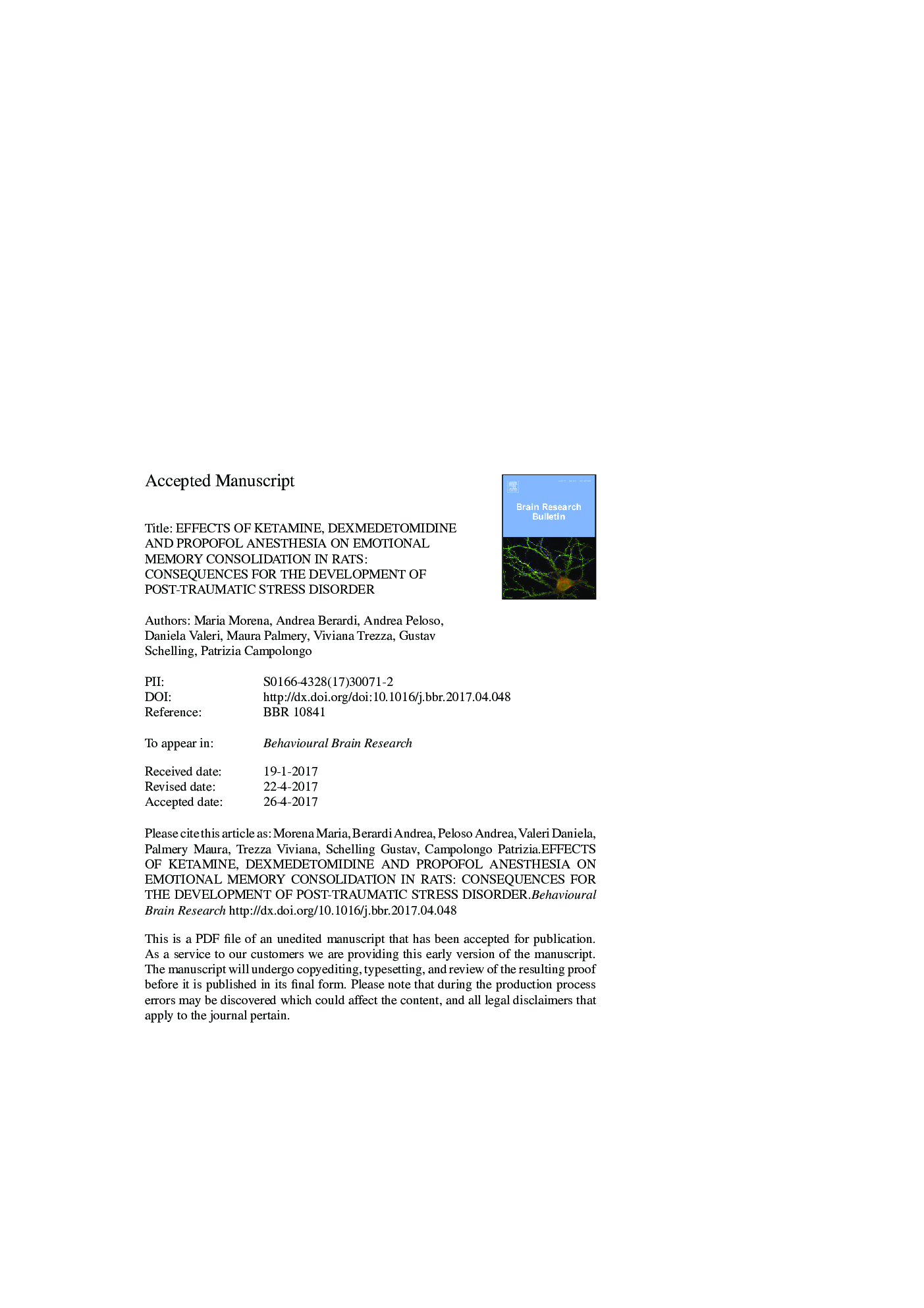| کد مقاله | کد نشریه | سال انتشار | مقاله انگلیسی | نسخه تمام متن |
|---|---|---|---|---|
| 5735451 | 1612906 | 2017 | 24 صفحه PDF | دانلود رایگان |
عنوان انگلیسی مقاله ISI
Effects of ketamine, dexmedetomidine and propofol anesthesia on emotional memory consolidation in rats: Consequences for the development of post-traumatic stress disorder
ترجمه فارسی عنوان
اثرات بیهوشی کتامین، دگزمودمویدین و پروپوفول بر تثبیت حافظه هیجانی در موش صحرایی: پیامدهای توسعه اختلال استرس پس از سانحه
دانلود مقاله + سفارش ترجمه
دانلود مقاله ISI انگلیسی
رایگان برای ایرانیان
کلمات کلیدی
عوامل بی حس کننده، اختلالات استرس پس از ضربه تثبیت حافظه، کتامین، دگزامتامینید، پروپوفول
موضوعات مرتبط
علوم زیستی و بیوفناوری
علم عصب شناسی
علوم اعصاب رفتاری
چکیده انگلیسی
Intensive Care Unit (ICU) or emergency care patients, exposed to traumatic events, are at increased risk for Post-Traumatic Stress Disorder (PTSD) development. Commonly used sedative/anesthetic agents can interfere with the mechanisms of memory formation, exacerbating or attenuating the memory for the traumatic event, and subsequently promote or reduce the risk of PTSD development. Here, we evaluated the effects of ketamine, dexmedetomidine and propofol on fear memory consolidation and subsequent cognitive and emotional alterations related to traumatic stress exposure. Immediately following an inhibitory avoidance training, rats were intraperitoneally injected with ketamine (100-125Â mg/kg), dexmedetomidine (0.3-0.4Â mg/kg) or their vehicle and tested for 48Â h memory retention. Furthermore, the effects of ketamine (125Â mg/kg), dexmedetomidine (0.4Â mg/kg), propofol (300Â mg/kg) or their vehicle on long-term memory and social interaction were evaluated two weeks after drug injection in a rat PTSD model. Ketamine anesthesia increased memory retention without altering the traumatic memory strength in the PTSD model. However, ketamine induced a long-term reduction of social behavior. Conversely, dexmedetomidine markedly impaired memory retention, without affecting long-lasting cognitive or emotional behaviors in the PTSD model. We have previously shown that propofol anesthesia enhanced 48Â h memory retention. Here, we found that propofol induced an enduring traumatic memory enhancement and anxiogenic effects in the PTSD model. These findings provide new evidence for clinical studies showing that the use of ketamine or propofol anesthesia in emergency care and ICU might be more likely to promote the development of PTSD, while dexmedetomidine might have prophylactic effects.
ناشر
Database: Elsevier - ScienceDirect (ساینس دایرکت)
Journal: Behavioural Brain Research - Volume 329, 30 June 2017, Pages 215-220
Journal: Behavioural Brain Research - Volume 329, 30 June 2017, Pages 215-220
نویسندگان
Maria Morena, Andrea Berardi, Andrea Peloso, Daniela Valeri, Maura Palmery, Viviana Trezza, Gustav Schelling, Patrizia Campolongo,
